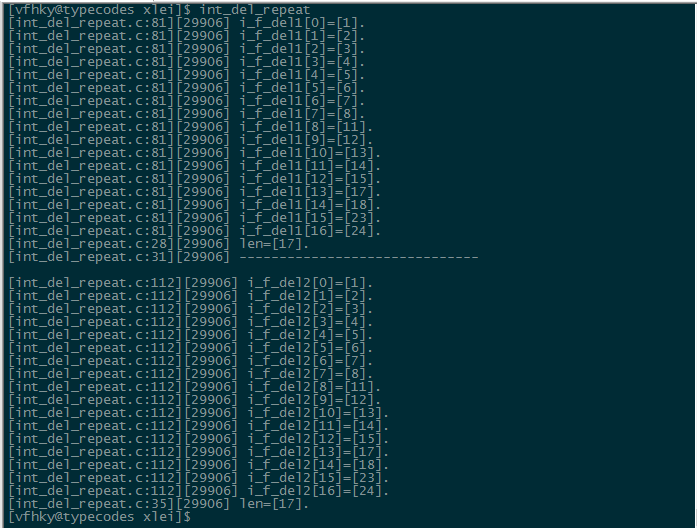1
2
3
4
5
6
7
8
9
10
11
12
13
14
15
16
17
18
19
20
21
22
23
24
25
26
27
28
29
30
31
32
33
34
35
36
37
38
39
40
41
42
43
44
45
46
47
48
49
50
51
52
53
54
55
56
57
58
59
60
61
62
63
64
65
66
67
68
69
70
71
72
73
74
75
76
77
78
79
80
81
82
83
84
85
86
87
88
89
90
91
92
93
94
95
96
97
98
99
100
101
102
103
104
105
106
107
108
109
110
111
112
113
114
115
116
117 | /**
* @FileName int_del_repeat.c
* @Describe A simple example for deleting the repeated elements in a deldisor interger array.
* @Author vfhky 2016-03-23 22:44 https://typecodes.com/cseries/deldisorderintarrrepeatele.html
* @Compile gcc int_del_repeat.c -o int_del_repeat
*/
#include <stdio.h>
#include <string.h>
#include <malloc.h>
#include "print.h"
int f_del1( int *i, int iLen );
int f_del2( int *i_f_del2, int len );
int main( int argc, char **argv )
{
//The test array.
int i_arr1[26] = { 1, 3, 2, 1, 2, 3, 4, 5, 5, 6, 7, 8, 12, 11, 22, 3, 7, 5, 13, 4, 5, 8, 7, 6, 23, 12 };
int i_arr2[26] = { 1, 3, 2, 1, 2, 3, 4, 5, 5, 6, 7, 8, 12, 11, 22, 3, 7, 5, 13, 4, 5, 8, 7, 6, 23, 12 };
int i_ar2r[26] = { 1, 2, 2, 3, 3, 3, 4, 5, 5, 6, 7, 8, 11, 11, 12, 13, 13, 13, 13, 14, 15, 15, 17, 18, 23, 24 };
int i_ar3r[26] = { 1, 2, 2, 3, 3, 3, 4, 5, 5, 6, 7, 8, 11, 11, 12, 13, 13, 13, 13, 14, 15, 15, 17, 18, 23, 24 };
//The length of .
int i_p_len = 0;
#if 1
i_p_len = f_del1( i_ar2r, 26 );
PRINT( "len=[%d].", i_p_len );
#endif
PRINT( "------------------------------\n" );
#if 1
i_p_len = f_del2( i_ar3r, 26 );
PRINT( "len=[%d].", i_p_len );
#endif
return 0;
}
//Method 1: Using malloc to init an array for storing the elements after deleting the repeated ones.
int f_del1( int *array, int iLen )
{
int i = 1;
int i_recycle = 0;
//Flags to store an element into the array i_f_del1.
int i_flag = 1;
//Length of the sorted array, name as i_f_del1.
int i_f_del1_len = 1;
//Init an array for storing the elements after deleting the repeated ones.
int *i_f_del1 = (int *)malloc( iLen*sizeof(int) );
//Init the first interger element.
*i_f_del1 = *array;
while( i < iLen )
{
i_flag = 1;
i_recycle = 0;
while( i_recycle < i )
{
if( array[i] == array[i_recycle++] )
{
i_flag = 0;
break;
}
}
//If i_flag equals 1, we should put the current element to the array i_f_del1.
if( i_flag )
{
i_f_del1[i_f_del1_len++] = array[i];
}
++i;
}
#if 1
for( i=0; i<i_f_del1_len; i++ )
{
PRINT( "i_f_del1[%d]=[%d].", i, i_f_del1[i] );
}
#endif
return i_f_del1_len;
}
//Method 2: cover up the repeated elements.
int f_del2( int *i_f_del2, int len )
{
int i = 0, j = 0, k = 0;
for( i=0; i<len; i++ )
{
for( j=i+1; j<len; j++ )
{
if( i_f_del2[i] == i_f_del2[j] )
{
for( k=j+1; k < len; ++k )
{
i_f_del2[k-1] = i_f_del2[k]; //cover up
}
--len;
//Key step to avoiding the continuous elements repeated more than 2 times.
--j;
}
}
}
#if 1
for( i=0; i<len; ++i )
{
PRINT( "i_f_del2[%d]=[%d].", i, i_f_del2[i] );
}
#endif
return len;
}
|



Comments »